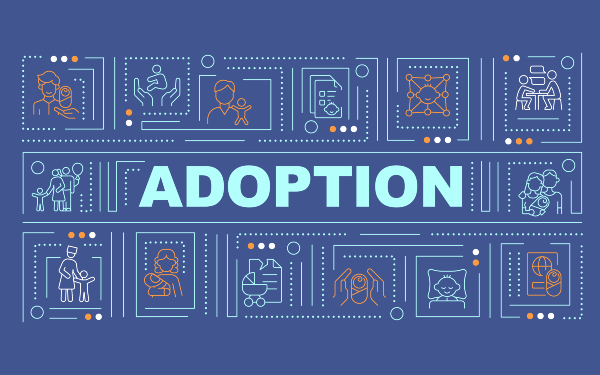
The adoption system is “institutionally racist”, sector leaders have warned, in a strategy designed to tackle ethnic inequalities facing children and prospective adopters and a lack of diversity in the workforce.
In its strategy for 2024-27, Adoption England, the national body supporting regional adoption agencies (RAAs), said it wanted to “end the racial disparity” that meant black children waited significantly longer than average to be adopted.
Key to this was increasing the number of black people approved to adopt and increasing the diversity of the adoption workforce, it added.
Adoption inequalities for black children
Black children are overrepresented in England’s care system, making up 7% of the total, compared with 5.5% of the child population.
However, they are significantly underrepresented in adoption, accounting for just 2% of those adopted in the year to March 2023 (source: Department for Education), while those placed for adoption wait significantly longer than average to be adopted.
Black children who had not been placed with a family had waited an average of 18 months since the grant of their placement order – 11 months longer than the average for white children – and 32 months since entering care, a full year longer than white children, according to the latest data, said Adoption England.
Need to recruit more black adopters
In a 2022 report, Ending Racial Disparity in Adoption, the now dissolved Adoption and Special Guardianship Leadership Board (ASGLB), said tackling the problem required RAAs and voluntary adoption agencies (VAAs) recruiting more black adopters, rebuilding trust with black communities and better resourcing interracial adoption.
According to a report last year published by the Black Adoption Project, there was a much smaller pool of potential adopters of the same ethnic background for black and mixed-race children across all regions than for Asian or white children, because of the former groups’ overrepresentation in the care system.
This meant agencies had to over-recruit black adopters to ensure there were sufficient potential matches for black children, said the project, which is a partnership between four London RAAs and equality, diversity and inclusion firm Laurelle Brown Training and Consultancy.
‘Multiple hurdles’ to adopting
However, people from black and mixed black ethnic groups accounted for just 2.7% of prospective adopters approved in England from 2018-19 to 2020-21, compared with the 6.4% of children placed for adoption from 2016-17 to 2020-21 who were from these backgrounds.
And while the number of black and ethnic minority approved adopters rose from 450 in 2019-20 to 698 in 2022-23, numbers had fallen back since, said Adoption England.
Its 2024-27 strategy said there were “multiple hurdles” facing black people considering adoption, with last year’s Black Adoption Project report saying black-only households were 5-6 times more likely than white-only households to leave the process without having adopted a child.
Financial barriers facing black households
Black people who contributed to the research cited “financial barriers and inequalities, a lengthy and challenging adoption process, a lack of post-adoption support (including culturally informed support), and the impact of racism and racial bias negatively affect their experiences and outcomes”.
For example, with 54% of black households reporting an income of less than £600 a week in 2020-21 – the highest of all ethnic groups – they were likely to be disproportionately affected by adopter assessments considering available space in the home and stability of income, said the report.
Focus group participants in the Black Adoption Project research also reported a lack of adoption promotion material specifically targeted at black communities.
Tackling discrimination in decision making
Among five outcomes in the Adoption England strategy are for adopters from diverse communities to be recruited, prepared and supported to meet children’s needs.
It said this should involve both RAAs and Adoption England’s national teams addressing bias and discrimination in processes and decision making to encourage recruitment of adopters that reflect the diversity of children needing adoption.
In an interview with Community Care, national adoption strategic lead Sarah Johal said Adoption England was funding the Black Adoption Project in testing approaches to improving the recruitment of black adopters.
Need to rebuild trust with black communities
“There’s a big thing on rebuilding that trust with black communities, looking at some of the barriers that people experience when they come forward to adopt and how they’re supported through the process as we know the drop-off rate is quite high.”
One issue highlighted in the ASGLB report was an apparent under-representation of black social workers in adoption teams.
This was in the context of research finding that black people open to, or in the process of adoption or fostering, are more likely to prefer to be assessed by a practitioner from the same ethnic background than white adults (60% v 46%).
In its strategy, Adoption England said it wanted RAAs to increase the diversity of both adoption panels and their workforces and that it would itself promote opportunities to develop greater diversity and
better cultural competence among adoption staff.
Adoption workforce ‘predominantly white’
Across local authority children’s services in England, 25% of social workers are from black, Asian and ethnic minority groups (excluding white minorities), compared with 18% representation in the general population of England and Wales.
However, an Adoption England spokesperson said: “From consultation with RAAs across the country, it’s clear that the workforce is predominantly white women. We have been supporting leadership initiatives to support global majority leaders in the adoption workforce and to increase the diversity of adoption panels but more needs to be done.”
Separately, Adoption England has jointly funded the development of a practice framework for decision making on transracial adoptions, which was launched last week.
Practice framework on transracial adoption
Produced by University of Sussex academics, led by Tam Cane, the anti-racist framework for decision-making and transitioning children from minoritised racial and ethnic groups into transracial adoptive families is based on nine principles, including:
- Recognising that transracial adoption can lead to trauma, with a lack of support to help the child develop a cohesive and positive sense of identity potentially contributing to confusion and identity struggles.
- Taking an anti-racist approach to practice, which involves “actively opposing discrimination, bias and stereotypes, and striving to eliminate systemic barriers that perpetuate racial inequalities”.
- Being culturally responsive, by prioritising “the preservation of a child’s cultural heritage and the need to embrace, celebrate and engage with the child’s cultural links over time”.
- Collaborating with and including birth parents in sourcing information about the child’s racial and ethnic identity and understanding the potential challenges and benefits of transracial adoption.
- Providing culturally sensitive pre- and post-adoption support.
Launching the report, Adoption England said the framework was seen as “a ground-breaking publication that underscores the unwavering commitment to improving positive identity outcomes for children in transracial adoption”.





 Bournemouth, Christchurch and Poole
Bournemouth, Christchurch and Poole  Hampshire County Council
Hampshire County Council  Lincolnshire County Council
Lincolnshire County Council  Norfolk County Council
Norfolk County Council  Northamptonshire Children’s Trust
Northamptonshire Children’s Trust  South Gloucestershire Council
South Gloucestershire Council  Wiltshire Council
Wiltshire Council  Wokingham Borough Council
Wokingham Borough Council  Children and young people with SEND are ‘valued and prioritised’ in Wiltshire, find inspectors
Children and young people with SEND are ‘valued and prioritised’ in Wiltshire, find inspectors  How specialist refugee teams benefit young people and social workers
How specialist refugee teams benefit young people and social workers  Podcast: returning to social work after becoming a first-time parent
Podcast: returning to social work after becoming a first-time parent  Podcast: would you work for an inadequate-rated service?
Podcast: would you work for an inadequate-rated service?  Family help: one local authority’s experience of the model
Family help: one local authority’s experience of the model  Workforce Insights – showcasing a selection of the sector’s top recruiters
Workforce Insights – showcasing a selection of the sector’s top recruiters 

 Facebook
Facebook X
X LinkedIn
LinkedIn Instagram
Instagram
Tam Cane deserves a medal and NOT an empire one!
I’m glad to see Laurelle Brown getting some flowers. Her presentation here is a joy to watch – https://youtu.be/_Ov8y8lcOhc